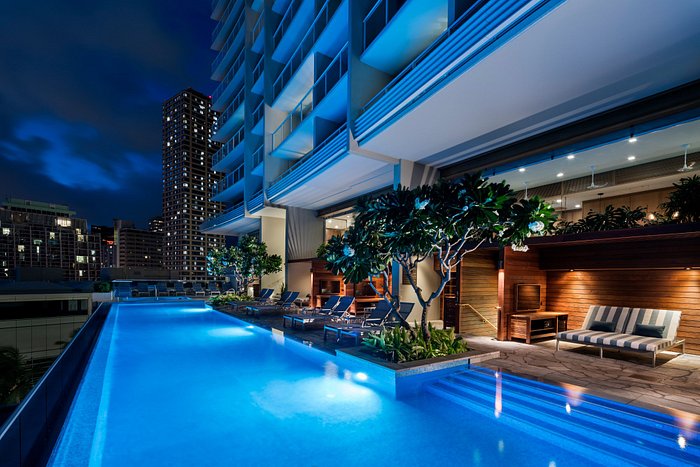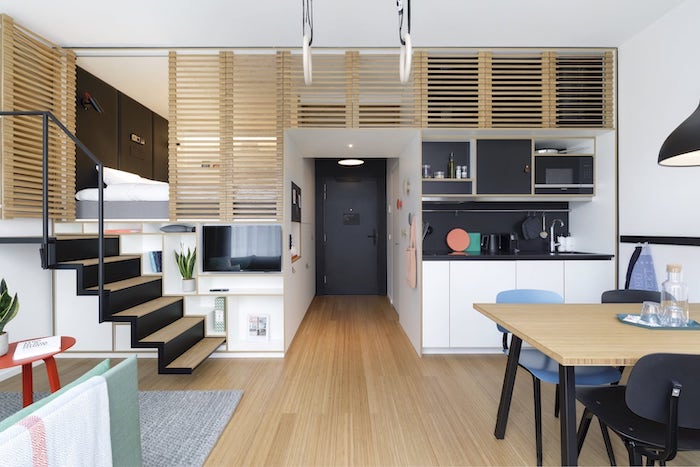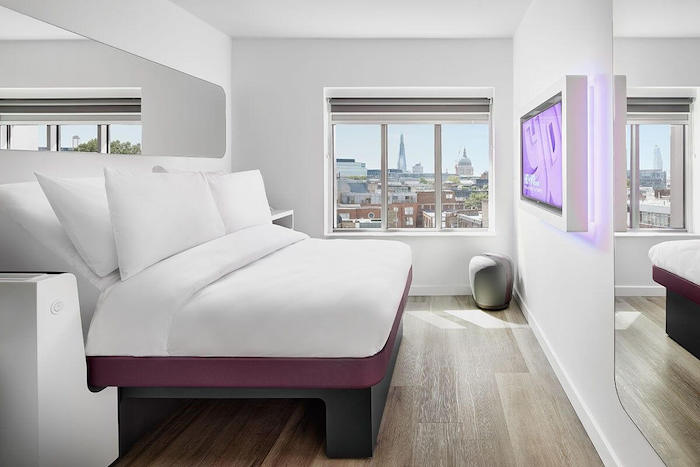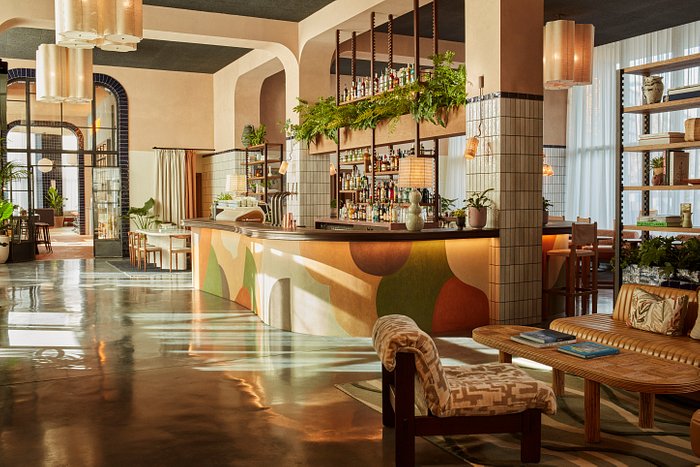Mixed-use hotels are a type of real estate development that combine different functions, such as hotels, residential units, retail spaces, and offices, within the same building or complex. They are becoming increasingly popular in the real estate industry due to their ability to create vibrant, dynamic communities that cater to the needs of both locals and tourists.

The significance of mixed-use hotels in the real estate industry cannot be overstated. They offer a range of benefits, including increased revenue streams, improved utilization of space, and greater flexibility in design and construction. Additionally, they provide an opportunity for developers to create sustainable, walkable communities that enhance the overall quality of life for residents and visitors alike.
The purpose of this blog post is to explore the potential of mixed-use hotels and their role in shaping the future of real estate. We will examine the current state of the industry, the advantages of mixed-use developments, and the specific benefits of mixed-use hotels.
We will also discuss examples of successful mixed-use hotels and the challenges and risks associated with these developments. By the end of this post, you will have a better understanding of the potential for mixed-use hotels to transform the real estate industry, and how investors and developers can take advantage of this opportunity.
Read: How Do Green Spaces Impact Our Well-being?
The Current State of the Real Estate Industry
A. Brief Overview of the Current State of the Real Estate Industry
The real estate industry has been experiencing significant growth over the past decade. However, the COVID-19 pandemic has caused some disruptions in the industry. Despite this, the industry has been able to adapt to the new reality, with a significant shift towards digitalization and remote working.
B. Challenges Facing the Industry
- Rising Property Prices: Property prices have been rising steadily, making it challenging for people to afford homes.
- Housing Supply Shortages: There is a shortage of affordable housing, especially in urban areas, leading to a rise in rental prices.
- Economic Uncertainty: The global economy is experiencing uncertainty, which can affect the real estate industry’s growth.
- Regulatory Changes: Regulatory changes, such as tax reforms and zoning laws, can impact the industry’s profitability.
C. Importance of Innovation in the Industry
- Adapting to Digitalization: The real estate industry needs to adapt to digitalization, which involves the use of technology to improve the buying and selling process.
- Embracing Sustainability: Sustainability is becoming a crucial aspect of real estate, with a focus on building eco-friendly structures and promoting green living.
- Enhancing Efficiency: Innovation can improve the efficiency of real estate operations, from construction to management, leading to cost savings and increased profitability.
- Meeting Changing Demands: Innovation can help the industry meet the changing demands of consumers, such as the demand for mixed-use developments that offer a variety of functions in one space.
In summary, the real estate industry is facing some significant challenges, but it has also been able to adapt to the changing circumstances. Innovation is becoming increasingly crucial in the industry, as it provides an opportunity to improve efficiency, meet changing demands, and embrace sustainability. By embracing innovation, the industry can overcome the challenges it faces and continue to grow and prosper.
Read: How to Finance Your Hotel Real Estate Venture
Mixed-Use Developments
A. Definition of Mixed-Use Developments
Mixed-use developments are real estate projects that combine multiple functions, such as residential, commercial, and retail, in the same space. These developments are designed to create a sense of community by providing a variety of services in one location.
B. Types of Mixed-Use Developments
- Horizontal Mixed-Use: This type of development consists of several buildings arranged on the same plot of land, each with its own function, such as retail, office, or residential.
- Vertical Mixed-Use: This type of development combines different functions in the same building, with residential units on the upper floors and retail or office spaces on the lower floors.
- Live-Work Developments: These developments combine residential and workspace in one unit, providing an opportunity for people to work from home while maintaining a work-life balance.
C. Advantages of Mixed-Use Developments
- Improved Quality of Life: Mixed-use developments provide residents with easy access to a range of services, such as shops, restaurants, and recreational facilities, improving their quality of life.
- Increased Convenience: The combination of different functions in one location reduces the need for travel, saving time and money for residents.
- Environmental Benefits: Mixed-use developments can reduce the environmental impact of urbanization by promoting sustainable living and reducing the need for transportation.
- Enhanced Economic Opportunities: The mix of residential, commercial, and retail functions in mixed-use developments provides economic opportunities for businesses, attracting investment and boosting local economies.
- Greater Flexibility in Design: Mixed-use developments provide greater flexibility in design, allowing developers to create unique and innovative spaces that meet the needs of their communities.
In review, mixed-use developments provide a range of benefits, from improved quality of life to environmental sustainability and economic opportunities. The different types of mixed-use developments offer flexibility in design, allowing developers to create unique spaces that meet the needs of their communities. As urbanization continues to grow, mixed-use developments are becoming increasingly important in creating livable, sustainable communities.
Read: Transforming Historic Buildings into Luxury Hotels
Mixed-Use Hotels
A. Definition of Mixed-Use Hotels
Mixed-use hotels are a type of mixed-use development that combines hotel accommodation with other functions, such as residential units, retail spaces, and office spaces, in the same building or complex. They are designed to provide a one-stop-shop for travelers’ needs, offering a range of services in one location.
B. Types of Mixed-Use Hotels
- Hotel-Residential: These mixed-use hotels offer both hotel accommodation and residential units, providing long-term living options for residents and short-term accommodation for travelers.
- Hotel-Retail: These mixed-use hotels combine hotel accommodations with retail spaces, offering travelers convenient access to shops and restaurants.
- Hotel-Office: These mixed-use hotels combine hotel accommodations with office spaces, providing a convenient location for business travelers.
C. Advantages of Mixed-Use Hotels
- Increased Revenue Streams: Mixed-use hotels can generate additional revenue streams from the different functions within the same space.
- Improved Utilization of Space: Combining different functions in one building or complex maximizes space utilization, reducing costs for developers.
- Greater Flexibility in Design: Mixed-use hotels offer greater flexibility in design, allowing developers to create unique and innovative spaces that meet the needs of their customers.
- Enhanced Customer Experience: Mixed-use hotels provide travelers with a range of services and amenities, enhancing their overall experience and increasing satisfaction.
- Sustainable Living: Mixed-use hotels promote sustainable living by reducing the need for travel and providing eco-friendly accommodations and facilities.
- Economic Benefits: Mixed-use hotels can boost local economies by attracting investment and creating job opportunities in the hospitality, retail, and office sectors.
In fact, mixed-use hotels offer a range of benefits, from increased revenue streams to enhanced customer experiences and sustainable living. The different types of mixed-use hotels provide flexibility in design, allowing developers to create unique and innovative spaces that meet the needs of their customers. As the hospitality industry evolves, mixed-use hotels are becoming increasingly important in providing travelers with a one-stop-shop for their needs and contributing to the growth of local economies.
Read: Hotel Real Estate: Analyzing Location Factors
The Future of Real Estate: Mixed-Use Hotels
A. Overview of the Potential for Mixed-Use Hotels
Mixed-use hotels have enormous potential to transform the real estate industry, providing a range of benefits for both developers and travelers. The growing demand for mixed-use developments, coupled with the increasing popularity of sustainable living, is driving the development of mixed-use hotels.
B. Advantages of Mixed-Use Hotels for Developers
- Improved Profitability: Mixed-use hotels can generate additional revenue streams from the different functions within the same space, increasing profitability.
- Reduced Risk: Combining different functions in one building or complex reduces the risk of investment loss, as revenue streams are diversified.
- Flexibility in Design: Mixed-use hotels offer greater flexibility in design, allowing developers to create unique and innovative spaces that meet the needs of their customers.
- Enhanced Value: Mixed-use hotels provide greater value to investors by offering a range of services and amenities in one location.
C. Advantages of Mixed-Use Hotels for Travelers
- Convenience: Mixed-use hotels provide travelers with a range of services and amenities in one location, reducing the need for travel and saving time and money.
- Enhanced Experience: The combination of different functions in one space enhances the overall travel experience, providing access to a range of services and amenities.
- Sustainable Living: Mixed-use hotels promote sustainable living by reducing the need for travel and providing eco-friendly accommodations and facilities.
- Cost Savings: The convenience and value offered by mixed-use hotels can lead to cost savings for travelers.
In short, mixed-use hotels have enormous potential to transform the real estate industry, providing benefits for both developers and travelers. The advantages of mixed-use hotels for developers include improved profitability, reduced risk, flexibility in design, and enhanced value. For travelers, mixed-use hotels offer convenience, an enhanced experience, sustainable living, and cost savings. As the hospitality industry evolves, mixed-use hotels are becoming increasingly important in providing travelers with a one-stop-shop for their needs while promoting sustainable, community-driven living.
Read: Repurposing Commercial Real Estate as Hotels
Examples of Mixed-Use Hotels
A. Case Studies of Successful Mixed-Use Hotels
- Rosewood, Hong Kong: This mixed-use hotel in Hong Kong combines hotel accommodations with luxury residential units and high-end retail spaces. The hotel has won numerous awards for its design and service and is widely considered one of the most successful mixed-use hotels in the world.
Source: booking.com - The Ritz-Carlton Residences, Waikiki Beach: This mixed-use hotel in Hawaii combines hotel accommodation with residential units, providing a range of services and amenities for both short-term and long-term residents. The hotel’s innovative design and luxury amenities have made it a popular destination for travelers and residents alike.
Source: tripadvisor.com
B. Discussion of Innovative Mixed-Use Hotel Projects
- Zoku: This innovative mixed-use hotel in Amsterdam combines hotel accommodation with co-living spaces, providing an opportunity for travelers to connect with like-minded people and work remotely. The hotel’s innovative design and focus on sustainability have made it a popular destination for young professionals and digital nomads.
Source: livezoku.com - Yotel: This mixed-use hotel chain combines hotel accommodation with airport lounges and co-working spaces, providing a range of services and amenities for travelers. The chain has expanded rapidly in recent years, with locations in major cities and airports around the world.
Source: yotel.com - The Hoxton: This mixed-use hotel chain combines hotel accommodation with co-working spaces and event spaces, providing a range of services and amenities for both travelers and local communities. The chain’s focus on community-driven spaces and sustainable living has made it a popular destination for young professionals and creatives.
Source: tripadvisor.com
In a nutshell, mixed-use hotels offer a range of innovative and exciting opportunities for developers and travelers alike. The success of mixed-use hotels like The Rosewood Hong Kong and The Ritz-Carlton Residences, Waikiki Beach demonstrates the potential for these developments to transform the hospitality industry. Innovative projects like Zoku, Yotel, and The Hoxton showcase the possibilities for community-driven, sustainable living in mixed-use hotel spaces. As the industry continues to evolve, mixed-use hotels are set to become an increasingly important part of the real estate landscape.
Read: 10 Top Real Estate Investments in Luxury Hotels
Challenges and Risks
A. Potential Challenges and Risks of Mixed-Use Hotels
- Coordination: Combining different functions in one building or complex requires coordination between multiple stakeholders, which can be challenging.
- Zoning and Permitting: Mixed-use hotels may face zoning and permitting issues due to the different functions within the same space.
- Investment Costs: Mixed-use hotels require significant investment costs, which can be challenging for developers.
- Legal Issues: Mixed-use hotels may face legal issues related to ownership, management, and liability.
B. Strategies for Managing These Challenges and Risks
- Effective Planning and Coordination: Effective planning and coordination between stakeholders can help manage the challenges of combining different functions in one space.
- Engaging with Local Authorities: Engaging with local authorities and understanding zoning and permitting regulations can help mitigate potential issues.
- Strategic Financing: Developers can manage investment costs by using strategic financing methods, such as public-private partnerships or crowdfunding.
- Legal Advice: Seeking legal advice from experts in real estate law can help address legal issues related to ownership, management, and liability.
All in all, mixed-use hotels present a range of challenges and risks, from coordination issues to legal and financial hurdles. However, with effective planning, strategic financing, and engagement with local authorities, these challenges can be managed and mitigated. Seeking legal advice from experts in real estate law can also help address potential legal issues. As the popularity of mixed-use hotels continues to grow, developers and investors must remain aware of these challenges and implement strategies to manage them effectively.
Read: The Benefits of Homeownership: Financial and Emotional
Conclusion
A. Recap of the Main Points
Mixed-use hotels integrate hotel accommodation with other functions like residential, commercial, and retail in a single building or complex. They offer various advantages, such as diversified revenue, improved customer experiences, and sustainable living. Effective planning, strategic financing, and collaboration with local authorities help manage the challenges and risks associated with mixed-use hotels.
B. Discussion of the Potential for Mixed-Use Hotels to Transform the Real Estate Industry
Mixed-use hotels possess immense potential to revolutionize the real estate industry by enabling developers to craft distinctive, community-oriented spaces. Integrating multiple functions maximizes design flexibility, space utilization, and service offerings for both travelers and residents. Furthermore, mixed-use hotels foster sustainable living, mitigate urbanization’s environmental effects, and enhance local economies.
C. Call to Action for Investors and Developers to Explore the Opportunities Presented by Mixed-Use Hotels
To stay competitive, investors and developers should explore mixed-use hotels, seize opportunities, overcome challenges, and meet consumer demands. These unique spaces contribute to local economies, provide convenience to travelers, and foster industry growth. Investing in mixed-use hotels allows for capitalizing on industry potential for growth and innovation.
On a final note, mixed-use hotels offer a range of benefits for developers, travelers, and local communities. Despite the challenges and risks, the potential for innovation and growth presented by mixed-use hotels makes them a valuable investment opportunity for investors and developers. By embracing the opportunities presented by mixed-use hotels, the real estate industry can continue to evolve and prosper.
Read: The Ultimate Guide to Renting a Luxury Apartment
Before You Go…
Hey, thank you for reading this blog to the end. I hope it was helpful. Let me tell you a little bit about Nicholas Idoko Technologies. We help businesses and companies build an online presence by developing web, mobile, desktop, and blockchain applications.
We also help aspiring software developers and programmers learn the skills they need to have a successful career. Take your first step to becoming a programming boss by joining our Learn To Code academy today!
Be sure to contact us if you need more information or have any questions! We are readily available.
Put Your Tech Company on the Map!
Get featured on Nicholas Idoko’s Blog for just $200. Showcase your business, boost credibility, and reach a growing audience eager for tech solutions.
Publish Now















